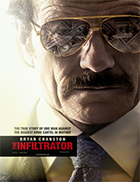The Infiltrator
|  Brad Furman’s The Infiltrator is based on the true story of an undercover U.S. Customs agent named Robert Mazur who spent five years in the mid-1980s infiltrating the world of corrupt banking and money laundering in order to disrupt the flow of money and drugs from South American drug lords, particularly the Medellín Cartel, which counted among its founders the infamous Pablo Escobar. Mazur’s operation resulted in the arrests of more than 100 people, many of whom were high-level bank officials and dealers, making it one of the biggest drug busts in U.S. history. Michael Mann, who hired Mazur as a consultant on Miami Vice (2006), recognized the entertainment potential of Mazur’s story, which led to Mazur publishing a book about his exploits, The Infiltrator: My Secret Life Inside the Dirty Banks Behind Pablo Escobar’s Medellín Cartel in 2009, which in turn provided the source material for Furman’s film. Brad Furman’s The Infiltrator is based on the true story of an undercover U.S. Customs agent named Robert Mazur who spent five years in the mid-1980s infiltrating the world of corrupt banking and money laundering in order to disrupt the flow of money and drugs from South American drug lords, particularly the Medellín Cartel, which counted among its founders the infamous Pablo Escobar. Mazur’s operation resulted in the arrests of more than 100 people, many of whom were high-level bank officials and dealers, making it one of the biggest drug busts in U.S. history. Michael Mann, who hired Mazur as a consultant on Miami Vice (2006), recognized the entertainment potential of Mazur’s story, which led to Mazur publishing a book about his exploits, The Infiltrator: My Secret Life Inside the Dirty Banks Behind Pablo Escobar’s Medellín Cartel in 2009, which in turn provided the source material for Furman’s film.Not surprisingly, the film’s taut screenplay (by the director’s mother, Ellen Brown Furman, a first-time screenwriter) deviates little from the expected formula. All of the ingredients we’ve come to expect from undercover thrillers—the strain of the work on the agent’s family, the emotional tear he feels about betraying the criminals with whom he grows close (what I like to call Point Break Syndrome), the constant close calls of having his cover blown—are all firmly in place, and Furman works them well. It also helps that he’s working with Bryan Cranston (Breaking Bad), who brings to Mazur a sense of weary determination and a born performer’s gift for deceit (despite his apparent blue-collar roots, Mazur could really turn it on with the gold-and-diamond set). In the film’s opening scene, Mazur is on another undercover operation when his wire starts to malfunction and burns his chest, resulting in an injury that gives him the opportunity to take early retirement. Yet, he agrees to the cartel operation, known as Operation C-Chase, which requires him to pose as Bob Musella, a slick, connected money launderer who gradually earns the trust of the cartels, partially through his relationship with the Bank of Credit and Commerce International (BCCI), then the seventh largest privately held bank in the world. Mazur works in collaboration with a number of other agents, including his partner, Emir Abreu (John Leguizamo), who works the dirt on the street-level operation while Mazur mixes with the high-rollers. He also has to take on a partner in Kathy Ertz (Diane Kruger), a young agent with no undercover experience, when he declines a prostitute offered to him by saying his has a fiancée. The introduction of Kathy complicates the operation, but also helps it, as well, as her presence arguably aids Mazur in getting closer to Robert Alcaino (Benjamin Bratt), a family man and jeweler who collected cash for the Medellín Cartel. Kathy’s friendship with Alcaino’s wife, Gloria (Elena Anaya), is indispensable to generating trust with Alcaino. Robert and Kathy being engaged also allows for the staging of a wedding that becomes the ploy for getting all the corrupt bankers and drug dealers into the same place at the same time to arrest them. The story in The Infiltrator is one of those that would be hard to believe if it weren’t true, and the film takes minimal license (by Hollywood’s standards, anyway) with the material as recounted in Mazur’s book. Furman, who previously directed both Cranston and Leguizamo in The Lincoln Lawyer (2009), keeps the film’s style notably tamped down using close-ups to draw indelible characters, which range from the lecherous, omnisexual Javier Ospina (Yul Vazquez), to Mazur’s long-suffering wife Evelyn (Juliet Aubrey), whose dedication to her husband and the profession that keeps him away from her and their son for so long understandably begins to erode with each passing year (Aubrey does the most she can with a fundamentally marginalized role). Cranston holds the center of the film, conveying a man who is very good at what he does, but still feels pangs of fear and doubt. He is constantly forced into awful situations, such as when he must humiliate a waiter at a fine restaurant to cover up the fact that he is celebrating his anniversary with his actual wife or when he finds himself at a strange voodoo ritual to connect with an important drug contact. Violence of the worst sort lurks just beneath the surface of every interaction, and things get bloody on numerous occasions, most memorably in a scene in which Emir’s cover is being blown by an angry informant who he must in turn frame for stealing money from the cartel. The close-up of Emir’s blood-spattered face at the end of the scene, barely quivering with both guilt for what he has done and elation that he is still alive, is a powerfully complex metonym for the film’s fundamentally conflicted emotional register. Like Mazur, we want to see the bad guys taken down at the end, and it is to the film’s credit that the moment of their arrest is bittersweet, as it is heavily punctuated by both the criminals’ sense of betrayal and Robert and Kathy’s mixed sense of victory, relief that the operation is at an end, and guilt for the charade they have pulled off. Copyright ©2016 James Kendrick Thoughts? E-mail James Kendrick All images copyright © Broad Green Pictures |
Overall Rating: 

 (3)
(3)


